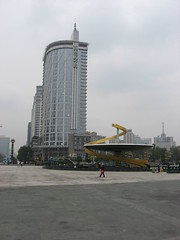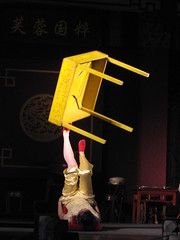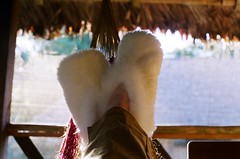I found the hostel with no problem, but there found my punishment for changing my lodging plans while on the train (choking on fumes, I'd decided it was critical to find a nonsmoker-friendly establishment). A sign informed me that the hostel had relocated, but notes were thoughtfully provided to direct taxi drivers to the new place. Sticking to the path of least resistance, I took a taxi to the new place. This turned out to be a good choice: Sim's Cozy Guesthouse is an oasis, cheap but comfortable and clean, with all the services a weary budget traveller could ask for.
I showered, breakfasted, and bought a plane ticket to Lijiang to leave Sunday evening. I bought a map and rented a bike and went back to the Wenshu Temple, which I explored thoroughly before feasting in its vegetarian restaurant. Then I walked along the streets in front of the temple, which are picturesque and touristy.
An old man with a smooth, friendly face and a cowboy hat stopped me on the sidewalk and asked where I was from. He told me he would give me an American history lesson. His strong accent and many missing teeth made it a hard lesson to understand, but the gist was that in 1943 Roosevelt sent airmen to Chengdu to fight the Japanese. People walking by turned to look at us curiously. The old man asked me where I was going in China, and made a comment about Xi'an that I didn't understand. Then he said goodbye.
I pedaled south to the giant Mao statue and admired the new subway station in the square in front of him. The next stop was the thatched cottage of Du Fu, a Tang dynasty poet. His actual cottage is long gone, but hundreds of years ago an admirer built a new cottage in the same area, and subsequent dynasties have maintained and added to the cottage. Not a bad way to venerate someone, I suppose.
This was clearly a major tourist attraction, and I was impressed that the Chinese had so much love for their poets. The only equivalent I could think of in the Anglophone world is Stratford-on-Avon. I resolved to read some of Du Fu's work back in the States.
I stopped in at the site's tea garden and was reading when a man came by my table and asked whether I was English. American was good enough--"you speak English, anyway." He was an overweight man in his 50s with a Chinese woman. She was well-dressed with fashionable glasses, perhaps 20 years younger than him. He asked me whether this was my first time in China and what I thought of it, and I said it was great but overwhelming, which was the prelude he needed to launch into a near-monologue about how China is better than England because it's cheaper and the people are friendlier and the women are "superior" to English women, because they won't argue with you. Also Chinese is the hardest language for English speakers to learn, but when he gets back to England he's going to put "her" into an English class, because it's much easier for a Chinese woman to speak English. "They're quite clever, you know. They're not as stupid as we think." I wondered whether my nodding could be taken as agreement that I thought the Chinese were stupid, or that they actually were clever. When he talked about liking women who won't argue I did say something like, "If that's what you're into," but I'm not one to pick fights with strangers in tea houses.
I watched him waddle off with his mail-order bride, or whatever she was, after they'd showed me their electronic translators (his black, hers pink and white), and marveled that anyone could be so obliviously offensive. But his colonial outlook seemed so anachronistic in the China I saw that I couldn't get worked up about it, but somewhat grossed out.
I headed back toward the hostel post-tea, but managed to get a little lost. I think it took about an hour and a half to get there. Given my now-vast experience with bicycling in China, I will here record some principles:
- Adopt an unshakable Zen mindset. Take nothing personally, and let nothing startle you.
- American ideas about right-of-way mean nothing. Pay attention to red and green lights, but treat them as suggestions.
- If you see an opening, take it.
- If you and another person go for the same opening, the one in the smaller vehicle yields. Bikes yield to everything but pedestrians.
- Keep in mind that there's safety in numbers. Do as the other bikes do.
Another early night. China overstimulated me with sensory information and with the depth of my own non-understanding. It also overwhelmed me with people, which might be why I became so introverted there. That day I was also having doubts about what I was accomplishing by traveling, doubts I'd had before. Since I can only hope to gain the most superficial understanding of a culture by wandering through a country for a bit, unable to speak the language, what's the point? I might as well be going around on a tour bus collecting pictures of myself with the Great Wall and the Tower of Pisa, or better yet, home watching the Travel Channel.
Yet the world still beckons. A superficial first-hand understanding seems superior to mere research.


